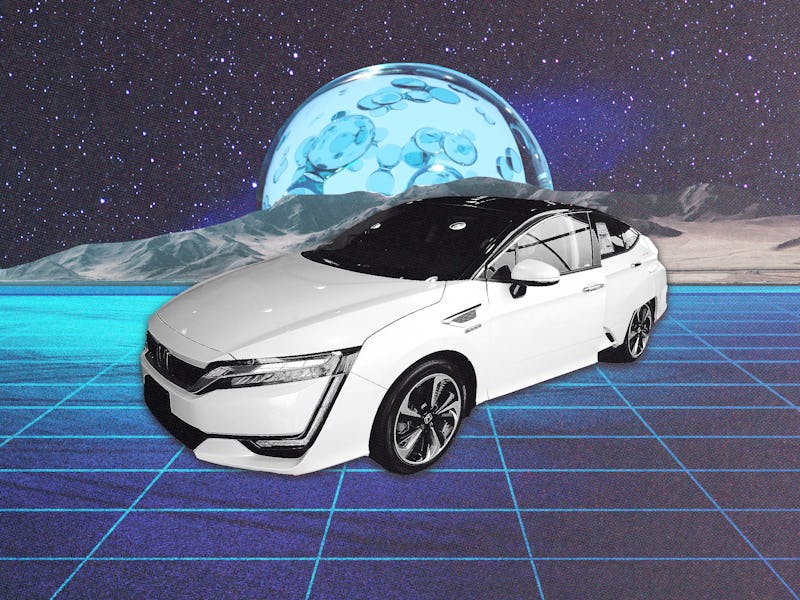Why Honda thinks hydrogen cars could dethrone battery-powered EVs
There’s still a lot of work to establish hydrogen fuel cell EVs as a real competitor in the growing EV market, but Honda thinks the tech is worth the investment.

When you’re looking at fully electric cars, you’re most likely looking at one that’s battery-powered. There is an alternative, however, and it all starts with hydrogen.
Though hydrogen fuel cells are far less popular than battery-powered EVs (BEVs), the tech is winning support from automakers like Honda, which recently announced plans to make a hydrogen version of the Honda CR-V starting in 2024.
That’s big news considering the CR-V is one of the best-selling compact SUVs in the U.S. So, what makes Honda so keen on getting its hydrogen alternatives out in the real world? Here’s what you need to know.
WHY HYDROGEN FUEL CELLS MIGHT BE BETTER THAN BATTERY EVS
A vehicle that runs on hydrogen fuel cells is still fully electric like its battery-powered counterparts, but the mechanism that powers them is different. Instead of a bulky battery pack providing electricity to power the EV, a fuel cell EV (FCEV) uses its hydrogen-filled cells to produce electricity to run the car.
The hydrogen fuel cells don’t act like power storage like what’s seen with battery cells, using a chemical reaction to generate electricity instead. That method provides a few upsides, like not having to rely on a bulky battery pack that weighs the EV down and reduces range.
You’ll get less range anxiety with FCEVs since they usually travel for longer distances due to hydrogen fuel cells being able to store more energy than batteries. You also won’t have to wait a half-hour to fuel up your FCEV since you can fill up on hydrogen in just a few minutes.
Fueling up the Toyota Mirai only takes a few minutes.
WHAT ARE THE DOWNSIDES TO HYDROGEN FUEL CELLS?
With those advantages come some notable disadvantages. The scarcity of hydrogen refueling stations would be the most glaring downside. According to the U.S. Department of Energy’s map, the majority of these hydrogen refueling stations are located in California, with some scattered about in Washington state and Hawaii.
Hydrogen-powered EVs are generally harder to produce than battery EVs since the technology behind them is a bit more complex. Hydrogen is also more expensive to refuel with compared to traditional gasoline, according to the California Hydrogen Business Council.
There are some concerns about using hydrogen since it’s a flammable gas, making it harder to store. However, existing FCEVs have their hydrogen fuel tanks rigorously tested. For example, the Toyota Mirai’s fuel tanks can absorb five times the crash energy of steel and have sensors that can stop the flow of hydrogen.
CAN YOU BUY A HYDROGEN EV RIGHT NOW?
Honda says its hydrogen-powered CR-V is due to hit the streets in 2024, but there are already some FCEVs on the market. Honda actually had a previous hydrogen-powered EV on the road called the Clarity, but that car was discontinued in 2021.
On the other hand, Toyota released its mid-size sedan, the Mirai, in December 2021 with a starting price of $49,500 and is now up to the 2023 edition. The only other hydrogen-fueled EV out right now is the Hyundai Nexo, which has been going strong since its debut in December 2018. The options for FCEVS are certainly far more limited than battery EVs, but that may change in the future.
The Hyundai Nexo is one of two FCEVs readily available on the market today.
WHAT DOES THE FUTURE OF HYDROGEN CARS LOOK LIKE?
Besides Honda’s hydrogen-powered CR-V, you can look forward to BMW entering the market with its iX5 Hydrogen. The German automaker confirmed that it was partnering with Toyota to make fuel-cell EVs, with plans to release one as early as 2025. As of this summer, BMW already started production on its iX5 Hydrogen, which uses Toyota-built fuel cells. Even Land Rover is working on an off-roader that’s powered by a hydrogen fuel cell.
Land Rover is working on a hydrogen concept version of its Defender off-roader.
There are plenty of conceptual hydrogen-powered EVs from automakers like Mercedes-Benz and Volkswagen. However, there’s also bad news as Audi has since given up on its plans to release its H-Tron EV as of December 2021.
Even though hydrogen fuel cells could carve out their own niche in the EV world, they’re still firmly in second place compared to their battery-powered counterparts. Still, automakers pursuing hydrogen cars are making big bets, and with great investment can come great success.
This article was originally published on